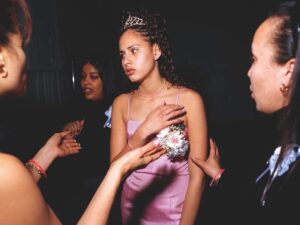“Art is, above all, for us: for our pleasure and our needs. As an artist, if we can help others at the same time, it is very rewarding.“
When it comes to French cinema, romanticism is a key element. The expression of divergent feelings in their purest form is mandatory. Known for her captivating sincerity on screen, the actor Hafsia Herzi has blossomed before the world’s eyes, beginning with a remarkable debut in Abdellatif Kechiche’s Couscous, for which she will end up being awarded multiple times, most notably with a César for Most Promising Actress of the year 2009. Ten years later, Hafsia Herzi decided in 2019 that she needed to be on both side of the camera. Her first full-length film “You Deserve a Lover” features herself as actress, producer and auto-productor.
The Premise:
Following Remi’s infidelity, Lila – deeply in love – is struggling to deal with their break-up. Lila will hold on to this relationship, moving from one encounter to the next, between discussion, consolation, and incitements, and cycling around to crazy love, Lila loses herself. Within this film, You Deserve a Lover, Hafsia Herzi delivers a fresh and vibrant first feature in the vein of Abdellatif Kechiche, who showcased her first role as an actress.
A multifaced performance by a multi-tasking woman. Fräulein spoke with Hafsia about love, work, and the things that come in between and after:
Fräulein: The subject of the film is about heartache and the feeling of loss, which is both a personal and universal topic. Was it a challenge to deal with such a subject?
Hafsia Herzi: Honestly, I haven’t really thought about it. I wanted to talk about love, which is indeed a universal feeling, I thought to myself that only if it were treated with sincerity, could it work. But I didn’t challenge myself in this. Moreover, I self-produced the film so I didn’t put pressure on myself. I knew I wanted to broach this subject and I knew that if it was done with sincerity, no one will be able to tell me if it is true, or if it is credible.
Fräulein: You claimed your role as a producer on the film, but you were also the director and an actress. Did this give you more freedom?
HH: Yes, completely, this is a self-produced film. From that moment on, I had complete freedom to do whatever I wanted. Which meant that even if I wanted to remake a scene, or cut sequences from a scenario, I could. It was as simple as that. I didn’t have the pressure of a producer who questions and rewatches the rushes. Total freedom! If I saw that a scene or a character was not working, I moved onto something else and I readjusted according to the people I met, the casting, the actors available… And the same concept for the sets! Sometimes friends offered me to shoot in their apartments. The scene of the meeting between Lila and the couple takes place in a friend’s spa, whooffered to make it available to me. I did not quite have the idea of the sequence at the time, but when I found myself within this scenery, it inspired me to create a new scene. It was all adaptation as we went along, without pressure.
Fräulein: Is this w ay of producing more natural in your opinion?
HH: Yes, there was no grassroots funding so most of the cast was doing work for their first time on screen, and the same for the techs. It was a shared experience, which came from the pure pleasure of filming. I wanted to make a film like this for several years and I finally said to myself “You have already pushed this project for too long. Now you have to do it.” Post-production was more difficult, because this step is expensive and it needs the services of many technicians. It was more complex, but we succeeded. Production without money is very hard. Shooting only takes a camera, some actors, and cut!

Fräulein: Your film shows the life of real Parisians, far from clichés. Was this a will on your part?
HH: Completely. As I said, I made this film with sincerity and it shows the multiculturalism of this city, through Parisian parties and the mentality of Parisians, too. In fact, it could happen everywhere! This film is about heartache, friendship, solidarity. I also had a lot of good feedback from abroad, which confirms that these topics are universal subjects and affects everyone. I especially wanted to talk about the youth of today, the one I know.
Fräulein: Is it a duty that is close to your heart to take on representation as a woman director?
HH: My film is about strong woman, who are weak at the same time throughout this story. I especially wanted to show the France of today which is like that: people from multiple origins are living all together and they don’t care about it. No need to wonder where Lila comes from, she could be anyone. It was important to me. These are the rules of friendship and love, we don’t think about it, we don’t wonder about the mix of cultures. It’s as if through a child’s gaze.
Fräulein: “You deserve a lover” is your first featured film for which you are awarded as a director and producer. Was this an important moment for you?
HH: Totally. I already had the chance to produce a short film in 2010. But the feedbacks on “You deserve a lover” were a real encouragement. It took a lot of work. Even though it’s a film made without funding, there is still a lot of investment and motivation needed to get up in the morning and bring people together around a project. Again, with no pressure, I didn’t promise them the moon, just to finish the movie and fight for it, while not even being sure the film would exist that way, or exist at all. It encourages me, but it’s a reward for them too, for the actors and the whole crew. It’s the work of a whole team. It’s very moving, very encouraging. Anyway, I have no regrets. I needed to do this.

Fräulein: And now? Are you already preparing a new film?
HH: I have already finished shooting it! It’s a project with actual funding this time, that I wanted to do before “You deserve a lover”… But it’s a project that took a long time to come up and on which I have already been working on for years. The shooting was done before the lockdown in France, and I did the rest at the end of it. That was rather complicated. We just finished the calibration in post-production, so the project is coming to an end.
Fräulein: Regarding the selection of your film at MyFrenchFilmFestival, was it moving to see this international sharing of your film during this period (when the cinemas are closed)?
HH: I was very proud when it was announced to me, and happy that it allows my film to continue existing and gives it the chance to be seen abroad. I received a lot of messages on social networks from different countries and it’s nice to see that it’s a French film which appeals to and moves people speaking different languages, thanks to subtitles and the imagery. It’s encouraging how many students have been able to discover the film and how many young directors have wanted to do the same, to shoot their own film even without funding. Many have asked me for advice and that makes me happy. Art is, above all, for us: for our pleasure and our needs. As an artist, if we can help others at the same time, it is very rewarding.

Text by Marien Brandon
All images courtesy of Les Films de la Bonne Mère



